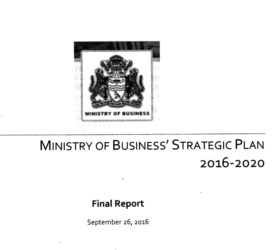Large and multinational companies operating in Guyana are to be engaged by government with a view to determining whether local suppliers can provide them with some categories of goods currently being imported from overseas.
The recently released 2016-2020 Strategic Plan promulgated by the Ministry of Business says that a workshop is to be conducted with those companies “to determine which of their currently imported intermediate goods could be procured locally from an existing supplier,” an exercise which it says “will help to compile a catalogue of demanded products and their quality and quantity specifications.” The catalogue will be made available to small and medium-scale companies. No timeframe is provided for the holding of the workshop.
The promised initiative is consistent with a vision for the growth and development of local small and medium-sized enterprises articulated by government, which envisages, among other things, increased market opportunities for goods produced locally.

Dominic Gaskin
The Strategic Plan says, meanwhile, that government is pinning its hopes for the growth and expansion of small business development on the successful intensification of the services provided by the Small Business Bureau (SBB) despite lingering questions about the capacity of the bureau to effectively execute its mandate.
Against the backdrop of increasing official dependence on the bureau to provide both grant financing and training to small business aspirants across the country, the Ministry of Business has now dropped a broad hint that the work of the key agency could be stymied down the road by funding constraints. In its recently released 2016-2020 Strategic Plan the Ministry of Business says that in the process of seeking to execute its mandate, “inadequate funding is a major concern” for the bureau. The report says that already, the bureau finds itself having to “water down” its approach “at the expense of appearing unproductive and invisible to the private sector.”
Part of the threat to the continuity of the SBB, one of the entities created under the 2004 Small Business Act reposes in the likelihood of “loss of key human resources to other organizations” once funding available under the existing Micro and Small Enterprise Development (MSED) programme is exhausted, according to the ministry’s Strategic Plan. Currently, seven key staffers are funded by the programme.
Last week this newspaper published an article detailing training costs for small business owners and aspirants amounting to more than $140 million over the past three years. The available evidence of high unit costs in several training areas raises searching questions as to whether such levels of expenditure can be sustained for much longer.

With the bureau at the commencement of its work conceding that it would not realize its target of creating 2,200 jobs in two years, the Ministry of Business may now come under pressure to undertake another important mission, that is, an analysis and assessment of the effectiveness and coverage of current training programmes being undertaken by the bureau. Such an analysis must, among other things, seek to determine whether such training had indeed focused on “access to public procurement and supplying to international corporations as well as being aimed at enhancing productivity and increasing market access and exports for small businesses.”
A key undertaking of the Ministry of Business as set out in its Strategic Plan is that of conducting “research and analysis of micro and small enterprises to public procurement, identifying the difficulties these enterprises face in complying with current regulations,” and proposing solutions to current challenges and, where, necessary, suggesting legal changes to existing laws. However, the plan sets no time frame for the completion of this undertaking.





